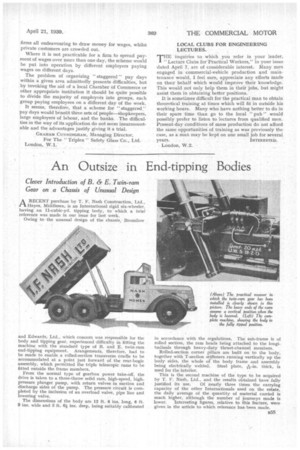An Outsize in End-tipping Bodies Clever Introduction of B. &
Page 91

If you've noticed an error in this article please click here to report it so we can fix it.
E. Twin-ram Gear on a Chassis of Unusual Design ARECENT purchase by T. F. Nash Construction, Ltd., Hayes, Middlesex, is an International rigid six-wheeler, having an 11-cubic-yd. tipping body, to which a brief reference was made in our issue for last week.
Owing to the unusual design of the chassis, Bromilow
and Edwards, Ltd., which concern was responsible for the body and tipping gear, experienced difficulty in fitting the machine with the standard type of B. and E. twin-ram end-tipping equipment. Arangements, therefore, had to be made to enable a rolled-section transverse cradle to be accommodated at a point just forward of the rear-bogie assembly, which permitted the triple telescopic rams to be fitted outside the frame members.
From the normal type of gearbox power take-off, the drive is taken to a three-throw solid ram, high-speed, highpressure plunger pump, with return valves in suction and discharge sides of the pump. The pressure circuit is completed by the inclusion of an overload valve, pipe line and lowering valve.
The dimensions of the body are 12 ft. 6 ins. long, 6 ft.
9 ins, wide and 3 ft, ins, deep, being suitably calibrated
in accordance with the regulations. The sub-frame is of rolled section, the ram heads being attached to the longituclinals through heavy-duty thrust-channel members.
Rolled-section corner pillars are built on to the body, together with T-section stiffeners running vertically up the body sides, the whole of the body frame and assembly being electrically welded. Steel plate, A-in. thick, is used for the interior.
This is the second machine of the type to be acquired by T. F. Nash, Ltd., and the results obtained have fully
justified its use. Of nearly three times the carrying capacity of the other Internationals used on the estate, the daily average of the quantity of material carried is much higher, although the number of journeys made is
lower. Interesting figures, relative to this feature, were given in the article to which reference has. been made.






































































































































